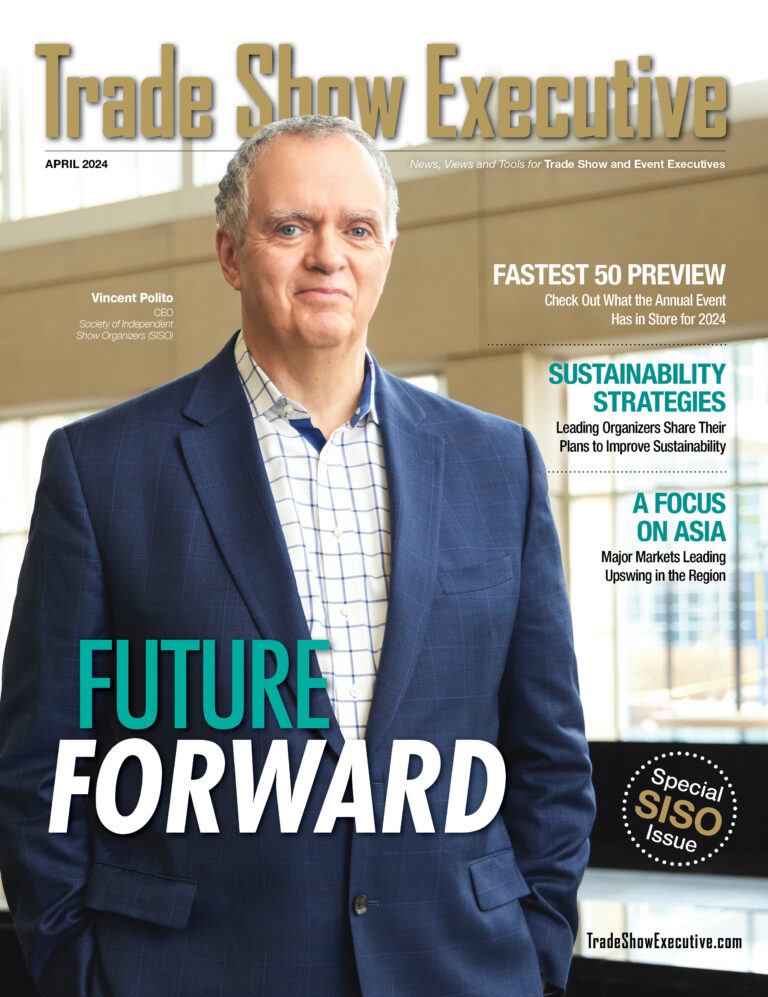Hurricane season in the Atlantic runs from June 1 through November 30, so despite the relief felt by those surviving the recent storms, it’s not over yet. Even if there are no more storms this year, other disasters lurk with less warning but the same potential to disrupt a show.
Experts from the National Oceanic and Atmospheric Administration (NOAA) have predicted a 90% probability of an above-to-near normal hurricane season. With the arrival of Hurricane Jeanne, this prediction has been borne out; it is the first time Florida has been hit with four hurricanes in one season.
Fortunately, show organizers and convention center managers have become adept at contingency planning, in part due to the precautions taken by everyone since 9-11. Here’s how two shows coped with the effects of the recent hurricanes and the advice they shared.
- Be Proactive
“Organizers have to be pre-emptive,” says Steve Kalman, Industry Vice President at Reed Exhibitions, organizers of the Florida Restaurant Show, which was rescheduled as a result of Hurricane Frances. “When we realized we had to reschedule, we had already taken care of the logistics and could move forward quickly,” he says.
Jerry Daigle, Deputy General Manager of the Orange County Convention Center agrees. “When organizers contact us early, it allows more time to discuss contingencies. We will do what we can to help everyone meet their needs,” he says, such as advancing move-in dates or expediting move-outs to avoid storms.
Proactivity also means that contracts and insurance cover all possibilities, protecting everyone’s bottom line. Many venue contracts include an active guard clause, which protects the facility from being held financially responsible for conditions beyond its control, such as hurricanes. Show organizers can protect themselves with insurance, and what insurance doesn’t cover, communication might.
Kalman says that all partners have been empathetic and flexible in handling the situation. He credits constant communication as a major reason for a smooth rescheduling process.
- Monitor the Situation
As soon as the hurricanes were announced, show managers moved into contingency planning. Because the warnings began several days before the hurricanes made landfall, organizers with events in the area had time to begin preparations. However, as the storms changed paths, they frequently found themselves facing last-minute decisions.
Alan C. McMillan, President and CEO of the National Safety Council, says, “We left Chicago knowing Hurricane Ivan was coming but not its exact path.” The organization’s 92nd Annual Congress and Expo was scheduled at the Ernest N. Morial Convention Center in New Orleans September 13-15.
NSC met with its partners, including representatives from the convention center, hotels, the convention and visitors bureau (CVB), emergency response units and the city, as soon as arriving to discuss contingency plans. “We thought Ivan would miss us, and we determined to go on,” recalls McMillan.
However, the group met three times daily to review the latest predictions. Armed with information that New Orleans was now directly in Ivan’s path and nervous about the mayor’s voluntary evacuation request, show organizers decided on the 14th to close a day early.
“We knew that because New Orleans rests up to 10 feet below sea level, flooding was a greater concern than winds. Naturally, our primary concern was the safety of everyone at the show, but we also wanted to give our exhibitors enough time to get their people and property safe,” says McMillan. About 750 exhibitors were on the show floor.
The Florida Restaurant Show also made the difficult decision to reschedule after prolonged monitoring. “We worked through Labor Day weekend, tracking the storms and talking to customers,” says Kalman. Organizers decided to reschedule the event for October 22-24 at the same venue, the Orange County Convention Center in Orlando. The implications are uncertain. “We’ve never hosted this event in October, which is the beginning of the high season for Florida. Of course, we expect conflicts to exist for some of our attendees and exhibitors, but the scheduled exhibitors are still registered, and we are selling space to new exhibitors as well,” shares Kalman.
- Don’t Be Daunted by Logistics
Rescheduling a show is not an easy task. In addition to having to communicate new dates and remarket the event, availability is an issue — not only must the facility be rescheduled but so must the special events, speakers and gala dinners. In addition, the show might take place in different halls, which requires new floor plans.
Logistics are also a challenge for those canceling altogether or shutting down early. McMillan says that he doubts they managed to notify everyone of the closure but feels they probably came close.
City infrastructure can also provide logistical challenges. New Orleans Mayor C. Ray Nagin made his voluntary evacuation request, McMillan noted that only 10 of 50 contractors show up.
Transportation was another issue. McMillan found that once they made the decision to close, for some, it was too late to get out. Flights and trains were booked, and traffic was congested. Kalman’s exhibitors had the opposite problem. Getting into the area had become difficult with troopers, traffic and gas shortages.
Long-Term Impact Unclear
Even so, Kalman says he wouldn’t change a thing in his planning. “We made the right decision for our customers,” he says.
The long-term impact is unclear. Some companies are still finalizing plans. Organizers of the New Orleans Dental Conference are determining how to proceed with their cancelled event. Others, like the Florida Restaurant Show, are handling the logistics of new dates. And still others, such as the National Safety Council, are considering whether to reimburse exhibitors for a shortened show and the effect this will have on their bottom line.
In the meantime, those with shows planned in the area in the near future will continue to monitor the weather station and prepare.
Reach Jerry Daigle, Deputy General Manager, Orange County Convention Center, at (800) 345-9845, jerry.daigle@occc.net; R. Brink Grush, Director of Sales and Marketing, Hyatt Regency New Orleans, at (504) 561-1234, bgrush@hyatt.com; Steve Kalman, Industry Vice President, Reed Exhibitions, at (203) 840-5556, skalman@reedexpo.com; Alan McMillan, President and CEO, National Safety Council, at (630) 285-1121; info@nsc.org.











